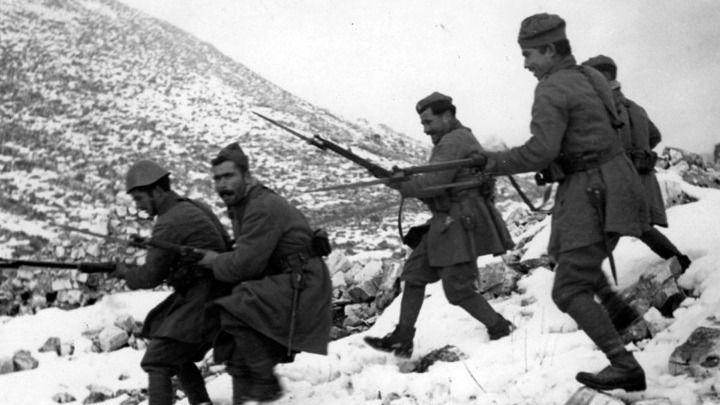Robert Zaller
Oxi Day is always the most significant secular observance on the Greek calendar after Independence Day itself. On Independence Day, Greeks rebelled to win their freedom against a seemingly insuperable foe after more than three and a half centuries of servitude. On Oxi Day, Greeks poured into the streets at dawn in spontaneous resistance to the far larger and better equipped forces of Italy’s fascist dictator, Benito Mussolini, who, without staying for a military ultimatum, had already launched his army across Greece’s northern frontiers. No power doubted the swift victory of the Italians. None but Winston Churchill’s beleaguered Britain any longer resisted the march of fascism, which in little more than a year had conquered or subordinated all of Continental Europe. And even if Italy should somehow fail or be sluggish in victory, behind it stood Hitler’s Third Reich, with an army thought unconquerable by any foe. Yet, the people of Greece did not even wait upon their government’s call. From the first hour of battle, they summoned themselves to fight for their freedom.
This was a remarkable and unprecedented act. The Greek polity itself had, for the four preceding years, been under the military dictatorship of General Yannis Metaxas, which banned all political parties save Metaxas’ own, crushing all opposition and dissent. In style and substance, the Metaxas regime clearly emulated the fascist powers that surrounded it. The Greeks were, in effect, rising up to recover a freedom they had already lost. But there was a critical difference. Losing the institutions and accoutrements of a democracy was one thing; these could be with time restored. But losing the soil of Greece itself, and falling again to the lash of a foreign conqueror, was to lose its soul and history. To that even Metaxas would not submit. He would be a dictator over his fellow countrymen, believing himself to be their savior from anarchy. But he would not willingly subject them to a foreign despot. So he called them to action. But they had not waited for him. It was not he who was leading them, but they him.
Every Greek knows the sequel. Greek forces hurled the invader back, and took foreign territory of their own. Mussolini was defeated, and Hitler was obliged to send the overwhelming force of the Wehrmacht to rescue him. Greece fell under brutal and remorseless occupation. But Greek resistance delayed Germany’s planned invasion of Russia for critical weeks, and its example inspired resistance movements elsewhere. In the United States, Greece returned the example Americans had formerly given it to fight again for freedom. A small country, at great and heroic sacrifice, had shown the world once more what could be done in defense of the ultimate value of the human community.
This story is what Greeks, philhellenes, and lovers of freedom everywhere celebrate on Oxi Day. But the observances of 2022 come at a particularly perilous time, especially for Greece and its immediate neighbors but also for all those who cherish freedom and democracy worldwide.
After years of encroachment and occupation, and months of taunting exercises on its frontier, the Republic of Ukraine was attacked on February 24 by a Russian army bent on, and fully expecting, immediate victory and the complete overthrow of Ukraine’s elected government. It was the victory the Persian empire had expected over Athens at Marathon in 490 B.C.E, by the Ottoman sultanate in 1821, and by Mussolini in 1940. Russia’s dictator, Vladimir Putin, looked for triumph within three days. In that time, he reckoned to have occupied Ukraine’s capital, Kyiv, and driven its president, Volodymr Zelensky into flight and exile. Resistance would be so obviously futile that no other outcome was possible. But Ukraine, forcibly occupied by the Russian tsars in 1654 and held in bondage for nearly as long as Greece under the Ottoman Turks, did not submit and was not conquered. It fights on today, its most dogged resistance coming from the largely Greek city of Mariupol, which had to be leveled virtually to the ground before it fell.
Greece itself immediately joined the great majority of the world’s nations in denouncing the Russian invasion, and in providing what material assistance and moral support it can, including base support for American forces in the region. It sees what happened to it on Oxi Day as repeated against its close Black Sea neighbor, with its own centuries-long Pontic history being erased on Ukraine’s shores. No less deeply, it sees its own Oxi Day reenacted in the heroism of Ukraine’s people, and with the same conviction and determination to persist until victory. No two countries have shared the same experience as intimately, and, as Greece not long ago inspired Ukraine in its own fight against fascism and Stalin’s communism, now today they stand as closely united as any. Russia, meanwhile, has done Greece the honor of declaring it a “hostile” country.
It is not merely Russia that unites Greece and Ukraine against a common enemy, however. The other power that does so is Turkey. Although nominally a member of NATO and supposedly the guarantor of the navigational freedom of the Black Sea, it has been a principal abettor of Putin’s aggression, not only supporting the blockage of Black Sea shipping on which much of the beleaguered Ukrainian economy and the food supply from it on which Africa desperately depends, but, as an energy purchaser and pipeline, as a critical intermediary in Putin’s defiance of international sanctions and thereby a direct financier of his war. China, India, North Korea, and Iran have been singled out as primary supporters of that war through purchases and military supplies, but in many ways Turkey has been Moscow’s key ally. At the same time, the Turks have taken advantage of their brutal relationship with Putin to put renewed pressure on Greece, challenging Greek defenses, contesting Greek control of its Aegean islands and subsea wealth, and issuing maps showing Turkish sovereignty over territories that—like Putin’s asserted control of Russia’s former imperial territories—seeks to unilaterally revoke international conventions of a century or more. This has drawn Greece into the web of Russian expansionism, and confronts it with some of its most serious security issues in decades. NATO will shortly consider the admission of two new member states, Sweden and Finland. It may well have to consider whether it is not one member too large as it stands.






